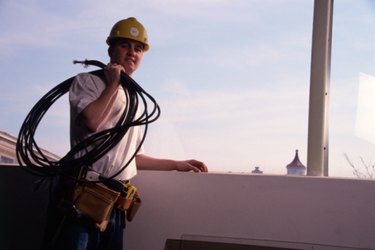
Out of the many conduit forms available, PVC conduit is considered best for outdoor applications. Among all conduit types, PVC is lightweight and versatile. Available in a variety of thicknesses or grades, PVC is well suited for direct burial or above ground work. PVC conduit is also used for many electrical requirements. This product is flexible and durable and resists corrosion.
Flexible PVC Conduit
Video of the Day
Flexible conduit systems are available with special fittings. PVC flexible conduits are suited for an extensive range of applications. Flexible conduit offers excellent protection from moisture due to its ingrained mechanical properties. Yet, the flexible units are best used in dry areas. The flexible conduit fittings are not as watertight as fittings for rigid PVC conduit. Flexible PVC is also a lighter gauge than rigid wall conduit. For these reasons, flexible PVC should be used above ground and not buried.
Video of the Day
Rigid Wall Conduit
Solid wall, rigid PVC conduit is suited for any application which requires conduit for electrical or plumbing chases. The material used to make a rigid conduit can be connected with watertight, removable fittings or glued together using PVC cement. The rigidity of this type of PVC conduit makes it suited for use both above and below ground. When used underground, installers should lay a pipe which is significantly larger than the minimal required pipe diameter.
Above Ground Applications
Above ground conduits are used to route electrical wiring so that the wiring is protected from the elements and physical damage. Both flexible and rigid conduit can be used for above ground applications. When using flexible conduit, the materials should be anchored every 12 to 16 inches to prevent the conduit from sagging, creating a situation which binds the electrical wire inside. When using rigid wall PVC conduit, the product has a high degree of expansion and contraction due to changing temperatures. Therefore, when used above the ground, PVC conduit should be mounted with friction fit fasteners, as to allow movement caused by expansion and contraction.
Below Ground Applications
Solid wall PVC conduit is highly desirable for underground installations. The PVC materials do not corrode like metal conduit, and the materials remain stable in all temperatures. For installations of communication cable and power cables, conduits should have large diameters so wiring can be pulled through the buried tubing. Underground conduits are typically at least two inches in diameter. A collection of these conduits can be bundled together and buried directly into the earth for applications which require large numbers of wires pulled between buildings. In industrial and commercial applications, PVC conduits are buried and encased in concrete.